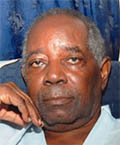Ade Ajayi, Jacob

Jacob Festus Ade Ajayi was a pioneer in the study of African history who highlighted native perspectives and the complexities of colonial-era change.
Life Story
Ajayi was born May 26, 1929 in Ikole Ekiti, western Nigeria, to Christian parents, Ezekiel Adeniyi Ajayi, a postmaster and later private secretary to the area’s ruler, and Comfort Bolajoko. Jacob went to Igbobi College, Lagos. He was a foundation student at University College, Ibadan (which became the University of Ibadan) before moving to University College, Leicester (now Leicester University). He gained his PhD in African history in 1958 at the University of London.
In 1956, he married Christie Aduke Martins, a teacher and specialist in early childhood education. They had five children, Yetunde, Niyi, Funmilayo, Titilola, and Bisola.
Working mainly at the University of Ibadan, Ajayi was a lecturer (1958-63), professor (1963-89), and then emeritus professor. He was a leading light, with the late Kenneth Dike, of the Ibadan history school, an influential group of Nigerian and foreign academics in the university’s history department dedicated to formulating an Afro-centric view of the continent’s past. The group started the Journal of the Historical Society of Nigeria to counter journals elsewhere that still adhered to colonialist and racist views. He was also a founder of the Ibadan History Series, produced with Longmans during the 1960s, a series of scholarly works providing new perspectives on African history.
From 1972 to 1978, Ajayi was vice-chancellor of the University of Lagos. He took over a demoralized institution; when he left, it was of international standing. He reorganized the ramshackle academic structures and put in place a corruption-proof appointments system. However, collision came with the military government, which faced student protests when it put up fees. The university, being the nearest to government headquarters, was encircled by armed police and a student was shot dead, for no apparent reason. Ajayi reacted by organizing a moving funeral on campus. He was summarily dismissed and went back to Ibadan. A colleague said: "I never heard him raise his voice."
Ajayi was a great believer that historical knowledge should serve the everyday world. He was a major influence in reforming the Nigerian school curriculum to reflect Africa-focused research, working with the examination system and government policymakers, and helping produce appropriate textbooks.
Outside academia, he used his skills as a historian to assist traditional rulers in assessing their post-colonial roles, and occasionally to mediate quietly between state governors, while never becoming involved in partisan politics. He also solved a problem for national census-takers, who had to deal with non-literate people unaware of their age; he prepared a special handbook of important historical events, so that if, for instance, someone said she was born in the year of influenza, they could record 1918. He played an active role in many international bodies, including the International Africa Institute in London.
Legacy
Ajayi was a trailblazer in the field of African history. Before Ajayi, historians of Africa generally privileged the points of view of outsiders to the continent—colonialists, missionaries and other non-native-Africans. It remains in use by teachers and students today. Ajayi collaborated with Ian Espie on a book called A Thousand Years of West African History (1965), which educators still use today. The book drew from the archaeological record and from primary African sources, many of them in Arabic.
Ajayi charted a new course for African historiography by offering a balanced treatment of both western and African perspectives. In his book Christian Missions in Nigeria 1841-91 (1964), Ajayi asserted that the century of colonialism, before Nigeria became independent in 1960, was actually a brief period in history, and that the colonizers worked through established African institutions rather than setting up their own structures.
Ajayi also wrote a biography of Samuel Ajayi Crowther, the first African bishop in the Anglican Church, entitled A Patriot to the Core. In it, Ajayi showed that the advent of Nigerian Christianity created a new class of elites, Africans educated by the West, whose aims often diverged from those of the established leadership. In a paper for the Journal of the Historical Society of Nigeria, published in 1960, he contended that the 19th century saw an early nationalism germinating in this elite class.
As dedicated as he was to emphasizing identity for Nigerian and African people, he was also intent on not glorifying the past. In 2010, he was one of eight Nigerian historians to contribute to Slavery and Slave Trade in Nigeria, which made the case that the traditional academic focus on the external slave trade, particularly the trans-Atlantic trade to Europe, the Americas, and the Caribbean had underplayed the importance of the much older indigenous trans-Saharan and trans-Indian Ocean trades.
In this work, as in others, Ajayi was innovative in his use of a combination of oral and written history, which he was meticulous in evaluating. This allowed him to present African voices authoritatively to counterbalance the European and American perspective. Ajayi once said: "People of my generation learned how Britannia ruled the world," and he made it his life’s work to change that.
Jacob Festus Ade Ajayi died August 9, 2014. He was eulogized by the Nigerian president, Goodluck Jonathan, as having "a lasting place of honor as one of Africa’s greatest historians." His contribution was recognized by a state funeral in Nigeria.
Lalage Brown
This article, uploaded in 2017, was compiled from “JF Ade Ajayi Obituary” by Prof. Lalage Brown (Univ. of Glasgow) in The Guardian UK Online, September 10, 2014, https://www.theguardian.com/books/2014/sep/10/jf-ade-ajayi and a longer “memory book” version made available to family and friends.



